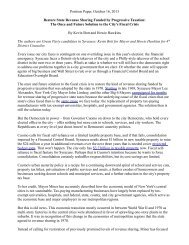Beyond Decriminalization: Sex-work, Human Rights and a New ...
Beyond Decriminalization: Sex-work, Human Rights and a New ...
Beyond Decriminalization: Sex-work, Human Rights and a New ...
- No tags were found...
Create successful ePaper yourself
Turn your PDF publications into a flip-book with our unique Google optimized e-Paper software.
PIVOT LEGAL SOCIETYreceiving part of the base fee, the <strong>work</strong>er is able to negotiate a “tip” with the client by offering sexualservices at various prices. In many cases, the <strong>work</strong>er keeps the entire “tip.”ii. Fees for both the introduction <strong>and</strong> the sexual services are split between <strong>work</strong>er <strong>and</strong> owner on apercentage basisThe business owner charges an all-inclusive flat rate for a period of time with an escort thatincludes payment for sexual services. At the outset, the client is informed of the services being offered.All-inclusive fees negate the need for any kind of negotiation between the <strong>work</strong>er <strong>and</strong> the client.Usually the fee is split evenly between the business <strong>and</strong> the sex <strong>work</strong>er. In this pay structure the<strong>work</strong>er’s earnings are proportionate to the number of clients that they see.An owner who participated in this study described the fee-split arrangement as a straightforwardfinancial arrangement between owner <strong>and</strong> <strong>work</strong>er. In her establishment, the split was 50-50. She saw the50 percent fee to the establishment as necessary to cover the <strong>work</strong> infrastructure she provides, includingphone answering, screening of clients on the phone, protection of anonymity, advertising, etc.In describing the disadvantages of this payment structure, one participant said that it reduced herautonomy by making it more difficult to control the types of services she provides, her flexibility interms of rates charged for different services, <strong>and</strong> her overall earnings.3. Hourly wageThe “all-inclusive” structure described above pay an hourly wage to the <strong>work</strong>er, but only forthe time the <strong>work</strong>er spends with clients. In this system, a sex <strong>work</strong>er can spend a great deal of timewaiting for clients without being paid. However, there was little support among our participants forthe idea of implementing an hourly wage. Many sex <strong>work</strong>ers enjoy being able to control their <strong>work</strong>,<strong>and</strong> they sense that they can make more money by setting their own fees. For example, when askedwhether they would prefer an hourly rate, one escort explained that she would not, because it wouldbe hard to determine the hourly rate; she prefers to be able to tailor the fee to the particular serviceprovided, <strong>and</strong> the time spent with each client. She would limit the employer’s role to provision of asafe <strong>work</strong>place.Another former sex <strong>work</strong>er suggested that a wage implies a loss of control, <strong>and</strong> that she would preferpaying a small fee to an employer, determining herself what to charge the client. She did, however,believe that an hourly wage would benefit older women who have less bargaining power than theiryounger competitors.One massage parlour <strong>work</strong>er reported being paid an hourly wage. As well as providing massages<strong>and</strong> sexual services, she was required to clean the premises. As a massage attendant, she reported beingeligible for WCB, paying into CPP <strong>and</strong> EI, <strong>and</strong> earning B.C.’s minimum wage, even if there were nocustomers.4. Tips onlyIn some businesses, the <strong>work</strong>ers earn only the amount that the client pays above <strong>and</strong> beyond theinitial introduction fee paid to the establishment. The client pays an initial fee for the massage orfor the appointment with the escort, <strong>and</strong> then the <strong>work</strong>er negotiates the sexual services that will beprovided for a “tip.” This means that if a client does not want any services above <strong>and</strong> beyond whatthey paid for at the outset, the <strong>work</strong>er does not earn anything.Several sex <strong>work</strong>ers reported that, in their experience, they generally make more money under thetips-only system. However, the reality is that they can go to <strong>work</strong> <strong>and</strong> not earn anything if they do notget any clients. Further, if they have to pay fees to their employer while they are on the job, such as abooking-on fee, they may find themselves in a deficit. Nevertheless, many sex <strong>work</strong>ers reported thatthey appreciate having control over the financial aspects of their <strong>work</strong>.30
















